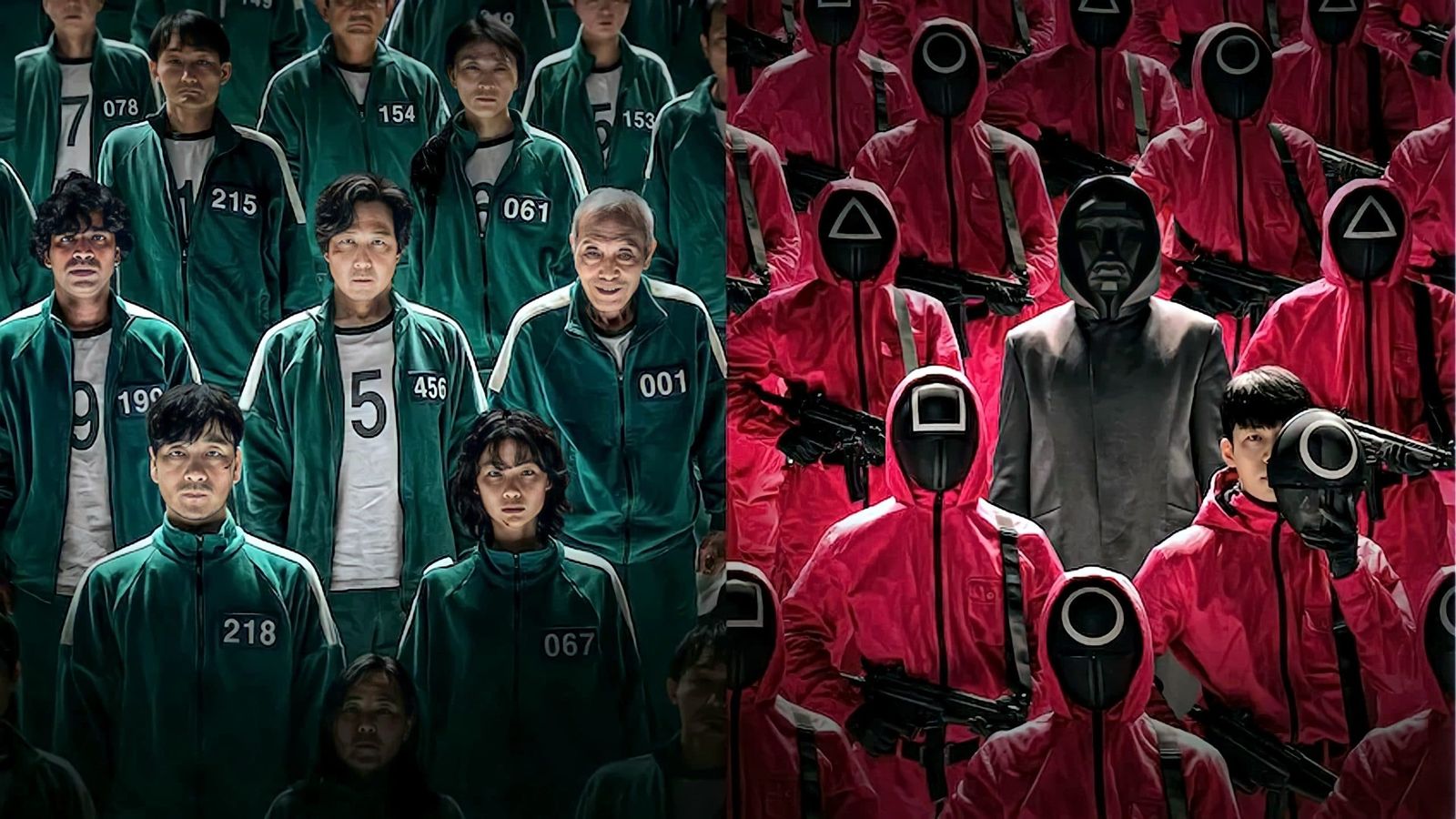From Playground Game To Global Hit: Why Squid Game Resonated With Millions
In September of 2021, a new Korean drama series titled Squid Game quietly debuted on Netflix. Within weeks, it had become a global phenomenon, captivating audiences worldwide and shattering streaming records. What was it about this show, which centers around a deadly competition of children's games, that resonated so deeply with millions of viewers from diverse cultural backgrounds?
The answer lies in Squid Game's ability to tap into universal themes of economic hardship, social inequality, and the human struggle to survive in a system that often seems rigged against the poor. While the show's premise is certainly extreme, with characters risking their lives for the chance to win a life-changing cash prize, its core message about the desperation caused by debt, job insecurity, and the ever-widening wealth gap struck a chord globally.
Squid Game's success also highlights the growing international appeal of Korean entertainment, which has seen a surge in popularity in recent years thanks to the global success of K-pop, Korean films, and dramas. The show's unique blend of genres - part social commentary, part survival thriller, part dark comedy - made it compulsively watchable, while its striking visuals and meme-worthy moments fueled its virality on social media.
The Premise Of Squid Game
At the heart of Squid Game's global appeal is its unique premise that takes the innocent games of childhood and twists them into a deadly competition. The show centers around Seong Gi-hun, a down on his luck gambling addict who is recruited to play a series of children's games along with 455 other cash-strapped individuals, all desperate for a chance to win a life-changing cash prize of 45.6 billion won (around $38 million USD).
The games themselves are simple and familiar - Red Light, Green Light; Tug-of-War; Marbles - but with a sinister twist. Players who fail to complete a game or break the rules are immediately killed, with their corpses piling up in the show's iconic pink-suited guard uniforms. The games are overseen by the mysterious Front Man, while the wealthy VIPs who have bet on the outcome watch from the sidelines, their faces obscured by masks.
As the games progress, the number of players dwindles while the stakes get higher. Alliances are formed and broken, and the players are forced to confront the moral consequences of their actions as they fight to survive. Gi-hun, in particular, struggles to maintain his humanity in the face of such dehumanizing circumstances.
Squid Game's unique blend of children's games and extreme violence is what initially grabs viewers' attention. But beneath the shocking premise lies a deeper social commentary on the effects of capitalism, inequality, and the lengths people will go to in order to escape debt and poverty. The show's allegorical nature allows it to tap into universal themes that resonate with audiences worldwide, despite its specifically Korean setting and characters.
Cast
- Lee Jung-jae as Seong Gi-hun (Player 456) - A down on his luck gambling addict recruited to play the deadly games
- Park Hae-soo as Cho Sang-woo (Player 218) - Gi-hun's childhood friend and a disgraced fund manager also competing in the games
- Jung Ho-yeon as Kang Sae-byeok (Player 067) - A North Korean defector who enters the games to earn money to bring her family to the South
- O Yeong-su as Oh Il-nam (Player 001) - The oldest player in the games who befriends Gi-hun
- Heo Sung-tae as Jang Deok-su (Player 101) - A gangster and player who forms an alliance in the games
- Anupam Tripathi as Ali Abdul (Player 199) - A migrant worker from Pakistan who teams up with Gi-hun
- Kim Joo-ryung as Han Mi-nyeo (Player 212) - A cunning and manipulative player who does whatever it takes to survive
- Gong Yoo as The Salesman - Recruits players to join the deadly games
- Lee Byung-hun as The Front Man - The masked organizer who oversees the games
Country Of Origin: South Korea
Production: Siren Pictures Inc.
Episodes: 9
Director: Hwang Dong-hyuk
Writer: Hwang Dong-hyuk
Original Title: 오징어 게임
Genre: Survival, Science fiction, Action thriller, Dystopian, Horror, Black comedy
Release Date: September 17, 2021
Streaming Platform: Netflix
Relatable Characters And Themes
One of the key reasons Squid Game resonated so deeply with audiences worldwide is its ability to craft characters that feel authentic and relatable, despite the show's extreme premise. At the heart of the story is Seong Gi-hun, a down on his luck gambling addict struggling with debt and unemployment. Gi-hun's desperation to turn his life around and provide for his elderly mother is a struggle that millions of people can empathize with, especially in the wake of the economic hardships caused by the COVID-19 pandemic.
Lee Jung-jae as Seong Gi-hun (Player 456)
Gi-hun is just one of the 456 players who enter the deadly games, each with their own backstories of financial ruin and personal tragedy. From the North Korean defector Sae-byeok, to the disgraced fund manager Sang-woo, the characters' shared experience of being "living on the brink of financial ruin" and "chased by creditors" is a reality for many in South Korea and beyond. The show's ability to tap into the universal struggles of debt, job insecurity, and the ever-widening wealth gap is a key factor in its global appeal.
Squid Game's themes of inequality and the flaws of capitalism also strike a chord internationally. The show's stark visual metaphors, like the white-clad billionaire "VIPs" betting on the games and the masked, police-adjacent guards, highlight the exploitative nature of the system. The players, desperate for a chance to win the life-changing cash prize, are essentially trapped in a rigged game that values their lives only as long as they provide entertainment for the wealthy elite.
These themes of social instability and the dehumanizing effects of capitalism are not unique to South Korea. Countries around the world, including the United States, are grappling with rising inequality, the erosion of the middle class, and the increasing financialization of essential public goods like healthcare and education. Squid Game's allegorical nature allows it to tap into these universal anxieties, making its critique of greed and classism resonate far beyond its Korean setting.
Squid Game's ability to craft relatable characters and timely themes is what allows it to transcend cultural boundaries and speak to audiences worldwide. By tapping into the shared experiences of economic hardship and the flaws of late-stage capitalism, the show has struck a nerve globally and cemented its status as a true cultural phenomenon.
Cultural Relevance And Accessibility
Squid Game's global success is not only a testament to its compelling storytelling and relatable themes, but also a reflection of the growing international appetite for Korean culture and media. In recent years, Korean entertainment has seen a surge in popularity worldwide, with the success of K-pop groups like BTS and Blackpink, as well as critically acclaimed films like Parasite and Train to Busan.
Squid Game taps into this global interest in Korean culture by showcasing uniquely Korean elements throughout the show. From the children's games rooted in Korean tradition, to the striking red-and-blue color scheme and the use of Korean language and customs, the series offers viewers a window into the cultural specificity of South Korea. This cultural relevance not only resonates with Korean audiences, but also piques the curiosity of international viewers who are eager to learn more about Korean society and its traditions.
Squid Game's appeal extends far beyond its cultural specificity. The show's universal themes of economic hardship, social inequality, and the human struggle to survive in a system that often seems rigged against the poor are struggles that transcend national borders. By crafting characters that feel authentic and relatable, despite the show's extreme premise, Squid Game is able to strike a chord with audiences worldwide.
Moreover, Squid Game's compelling storytelling and cinematic visuals make it highly accessible to international viewers, even with the language barrier. The show's use of subtitles and dubbing ensures that non-Korean speakers can follow the narrative, while its striking imagery and shocking moments are easily shareable and meme-worthy on social media. This accessibility, combined with the show's binge-worthy pacing and cliffhanger endings, has allowed Squid Game to captivate audiences globally and become a true cultural phenomenon.
In many ways, Squid Game's success represents a significant shift in the global entertainment landscape. The show's ability to tap into both cultural specificity and universal themes highlights the growing demand for diverse, authentic storytelling that transcends linguistic and geographic boundaries. As streaming platforms continue to invest in non-English language productions and make them accessible to wider audiences, it's likely that we'll see more shows like Squid Game emerge as global hits in the years to come.
Meme-Worthy Moments And Visuals
One of the key factors that has contributed to Squid Game's meteoric rise to global phenomenon status is its sheer meme-worthiness. The show is packed with shocking moments, striking visuals, and instantly iconic characters that have taken the internet by storm, spawning countless memes, GIFs, and social media challenges.
From the unsettling doll in Red Light, Green Light to the terrifying reveal of the Front Man's identity, Squid Game is full of jaw-dropping scenes that have left viewers reeling. But it's the show's visuals that have proven to be particularly ripe for meme-making. The bright pink jumpsuits and creepy masks worn by the mysterious guards have become an instantly recognizable symbol of the show, popping up everywhere from Halloween costumes to Etsy shops selling unofficial merch.
The show's logo, with its simple shapes and bold colors, is another visual that has captured the imagination of fans. Countless memes have reimagined the shapes as everything from Among Us characters to Wordle grids, demonstrating the show's ability to tap into the zeitgeist. And who could forget the iconic image of the show's protagonist Gi-hun, with his bright red hair and mischievous grin, which has become a staple of Squid Game memes and fan art.
But it's not just the show's aesthetics that have made it so meme-worthy. Squid Game is also full of quotable lines and memorable moments that have taken on a life of their own online. From the guards' chilling "Red light!" to the players' desperate pleas of "I'm not a horse!", the show's dialogue has provided endless fodder for meme-makers.
And let's not forget the games themselves, which have inspired a whole host of social media challenges. Videos of people attempting to recreate the games at home, from the deadly dalgona challenge to the terrifying marbles game, have racked up millions of views on TikTok and YouTube. These challenges not only showcase the show's universal appeal, but also demonstrate the way it has permeated into the collective consciousness of the internet age.
Squid Game's meme-worthiness is a testament to its cultural impact. By creating a world that is at once visually striking and emotionally resonant, the show has tapped into something primal in the human psyche. Its ability to inspire such a passionate response from fans, and to become such an integral part of the online conversation, is what has truly cemented its status as a global phenomenon. In an age where virality is the ultimate currency, Squid Game has proven itself to be a master of the meme.
Squid Game's meteoric rise from obscure Korean drama to global phenomenon is a testament to the power of storytelling that taps into universal human experiences. By blending the familiar trappings of children's games with a dystopian exploration of the desperate lengths people will go to escape debt and poverty, the show has struck a chord with audiences worldwide.
The show's success highlights the growing global appetite for diverse, culturally-specific content that still manages to speak to shared human struggles. Squid Game's striking visuals, meme-worthy moments, and compelling characters have made it a pop culture sensation, with the show's imagery and themes permeating far beyond the confines of Netflix. The show's ability to inspire everything from Halloween costumes to TikTok challenges demonstrates its unique hold on the collective imagination.
But beyond the surface-level virality, Squid Game's true power lies in its ability to hold up a mirror to the flaws of late-stage capitalism and the dehumanizing effects of inequality. By crafting a world where the desperate compete for the entertainment of the wealthy, the show offers a scathing critique of greed and the erosion of human dignity in the face of economic hardship. In an era of rising global inequality, Squid Game's message has clearly resonated, making it not just a pop culture phenomenon, but a cultural touchstone for our troubled times. As the show continues to captivate audiences and inspire think pieces, it's clear that Squid Game's impact will be felt for years to come.
I hope you enjoyed reading this blog post. Thank you for reading and have an awesome day.
Check out some feature articles on Asian TV and cinema?
How A South Korean Film Shattered Language Barriers And Won The Oscars
Binge-Worthy Bliss: Best Webtoon Adaptations Taking Streaming By Storm
From Webtoons to Dramas: The Source Material Behind Korean Hits
Jidaigeki: The Fascinating World Of Japanese Period Dramas
The Art of Tokusatsu: Crafting Japan's Greatest Visual Stories
Sageuk: A Window into Korea's Past Through Film and Television
Best Streaming Platforms To Watch Asian Movies And Drama
Beyond Mainstream: 7 Asian Films That Became Cult Classics
The Rise of Wuxia: A Journey Through Martial Arts Fantasy
J-Horror: How Japanese Horror Redefined Global Fear
Bollywood: A Unique Art Of Storytelling
Love Across Cultures: 7 Must Watch Asian Romance Films
10 Reasons Why You Should Watch Asian Cinema
The Cultural Phenomenon Known As The Hallyu Wave
5 Asian Movies And TV Dramas To Celebrate Motherhood
______________________________________________________________________________________________
Want a free NFT on the Polygon network? Visit HERE
Check Out some platforms I use for earning (NFA-DYOR)
Web3 Social Media:
Publish0x - Blogging platform where you earn crypto from reading and writing.
Bulb - New web3 blogging platform
Solcial - Web3 micro blogging platform
Torum - Fastest growing crypto community & earn rewards for your engagement
Tangled - Earn crypto while using the social media platform
Micro Earning Platforms:
Betfury - Online casino which offers staking reward's and hourly faucets
ADBTC - High paying PTC site
CoinPayU - OG micro earning crypto
EarnBitmoon - Crypto faucet
Final Autoclaim - Awesome micro earning site with passive income options
PipeFlare - Earn free ZCash (ZEC), Polygon (MATIC) & Flare (FLR) from the faucet
Other Links:
Linktree
______________________________________________________________________________________________


























